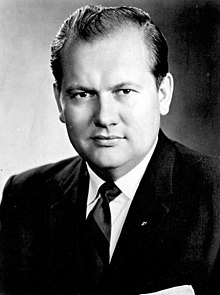William C. Cramer
| William Cato "Bill" Cramer, Sr. | |
|---|---|

U.S. Representative William C. Cramer in 1964
|
|
| Member of the U.S. House of Representatives from Florida's 1st district |
|
|
In office January 3, 1955 – January 3, 1963 |
|
| Preceded by | Courtney W. Campbell |
| Succeeded by | Robert L. F. Sikes |
| Member of the U.S. House of Representatives from Florida's 12th district |
|
|
In office January 3, 1963 – January 3, 1967 |
|
| Preceded by | New district |
| Succeeded by | Dante Fascell |
| Member of the U.S. House of Representatives from Florida's 8th district |
|
|
In office January 3, 1967 – January 3, 1971 |
|
| Preceded by | Donald R. Matthews |
| Succeeded by | Charles William "Bill" Young |
| State Representative from Pinellas County, Florida | |
|
In office 1951–1953 |
|
| County attorney for Pinellas County | |
|
In office 1953–1954 |
|
| Personal details | |
| Born |
August 4, 1922 Denver, Colorado, U.S. |
| Died | October 18, 2003 (aged 81) South Pasadena Pinellas County, Florida |
| Cause of death | Heart attack |
| Resting place | Woodlawn Memory Gardens in St. Petersburg, Florida |
| Political party | GOP U.S. Senate nominee, 1970 |
| Spouse(s) |
(1) Alice J. Cramer (divorced) |
| Children |
William C. Cramer, Jr. |
| Residence | St. Petersburg, Florida |
| Alma mater |
St. Petersburg Junior College University of North Carolina at Chapel Hill |
| Profession | Attorney |
| Religion | United Methodist |
(1) Alice J. Cramer (divorced)
William C. Cramer, Jr.
Mark C. Cramer
St. Petersburg Junior College University of North Carolina at Chapel Hill
William Cato "Bill" Cramer Sr. (August 4, 1922 – October 18, 2003), was an attorney and Republican politician, elected in 1954 as a member of the United States House of Representatives from St. Petersburg, Florida. He was the first Florida Republican elected to Congress since 1880, shortly after the end of Reconstruction. He was re-elected, serving without interruption until 1970.
In Congress Cramer became a ranking member of the Roads subcommittee of the Committee on Public Works, and influenced national highway policy at a time of major expansion, ensuring that Interstates were kept toll-free. He gained extra funding to link Tampa and Miami, in a federal interstate project built in Florida.
He was instrumental in the revival of the Republican Party in Florida through the mid-20th century, taking advantage of the state's changing demographics and new Republican migrants from the North and Midwest, and attracting Cuban Americans and other minorities to the party. Beginning in 1964, Cramer represented the state for 20 years on the Republican National Committee and served as its counsel for six years.
The long absence of Republican officials from state office and weakened condition of the party was due to suppression of black and Republican voting in the 19th century, and the disenfranchisement of African Americans at the turn of the century, as they had constituted the majority of the Republican Party. Most were not able to vote for decades. They re-entered the political system by gaining the power to vote after passage of the federal Voting Rights Act of 1965.
...
Wikipedia
